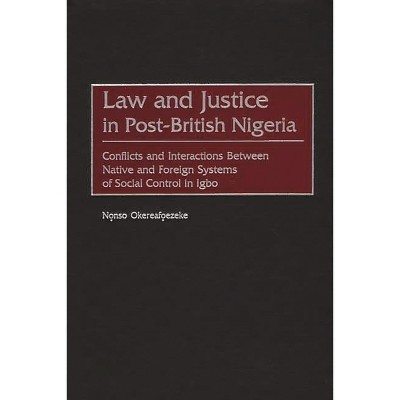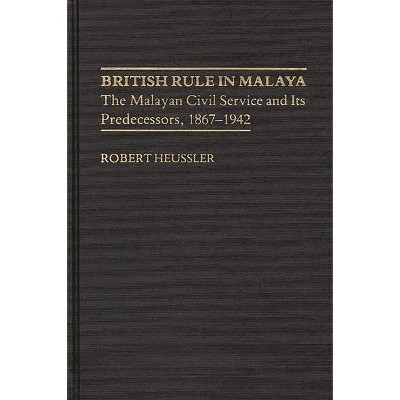Sponsored

Deadly Force, Colonialism, and the Rule of Law - (Contributions in Comparative Colonial Studies) by Joan R Mars (Hardcover)
In Stock
Sponsored
About this item
Highlights
- In post-colonial countries such as Guyana, the legacy of colonialism and its influence on policing and society is of crucial significance in developing an explanation for police violence and police-caused homicide.
- About the Author: JOAN R. MARS is Assistant Professor in the Department of Sociology, Anthropology and Criminal Justice at the University of Michigan, Flint.
- 224 Pages
- True Crime, General
- Series Name: Contributions in Comparative Colonial Studies
Description
About the Book
In post-colonial countries such as Guyana, the legacy of colonialism and its influence on policing and society is of crucial significance in developing an explanation for police violence and police-caused homicide. Mars applies a contextual approach, grounded in the conflict theoretical perspective, to explain and understand variations in police violence over time, and she extends her study to include the social, political, and legal structure in which such actions are embedded. Her findings support the notion that police violence is a function of decades of coercive state rule under British colonialism, as well as the state's legitimization of violence in police work.
In this first study on police violence and homicide in Guyana, Mars presents and analyzes data covering a 14-year period. She also provides comparative and descriptive information on the use of excessive and deadly force by the police, and, in addition, discusses laws relating to such incidents. Mars finds little support for the community violence hypothesis in reference to Guyana and concludes instead that the level of violence in the community and the everyday dangers of police work does not significantly influence the rates of police-caused homicide in that country.
Book Synopsis
In post-colonial countries such as Guyana, the legacy of colonialism and its influence on policing and society is of crucial significance in developing an explanation for police violence and police-caused homicide. Mars applies a contextual approach, grounded in the conflict theoretical perspective, to explain and understand variations in police violence over time, and she extends her study to include the social, political, and legal structure in which such actions are embedded. Her findings support the notion that police violence is a function of decades of coercive state rule under British colonialism, as well as the state's legitimization of violence in police work.
In this first study on police violence and homicide in Guyana, Mars presents and analyzes data covering a 14-year period. She also provides comparative and descriptive information on the use of excessive and deadly force by the police, and, in addition, discusses laws relating to such incidents. Mars finds little support for the community violence hypothesis in reference to Guyana and concludes instead that the level of violence in the community and the everyday dangers of police work does not significantly influence the rates of police-caused homicide in that country.Review Quotes
"Even though the scenario and the country have changed, police violence, especially the use of deadly force, is always a critical and controversial subject. For those who study in this area, there is a lack of reliable and accurate accounting of police-caused homicide. Despite this difficulty, Mars offers a deep and trustworthy discussion on police violence and its development in Guyana between the colonial and post-independence/modern eras....[t]his book is an excellent source for those who are interested in studying how the police have contributed to the social, political, and historical inheritance of Guyana. It would be a good supplement for criminal justice history courses as well as police courses that study the evolutionary impact that social movements have on the development and function of police."-International Criminal Justice Review
?Even though the scenario and the country have changed, police violence, especially the use of deadly force, is always a critical and controversial subject. For those who study in this area, there is a lack of reliable and accurate accounting of police-caused homicide. Despite this difficulty, Mars offers a deep and trustworthy discussion on police violence and its development in Guyana between the colonial and post-independence/modern eras....[t]his book is an excellent source for those who are interested in studying how the police have contributed to the social, political, and historical inheritance of Guyana. It would be a good supplement for criminal justice history courses as well as police courses that study the evolutionary impact that social movements have on the development and function of police.?-International Criminal Justice Review
About the Author
JOAN R. MARS is Assistant Professor in the Department of Sociology, Anthropology and Criminal Justice at the University of Michigan, Flint.










